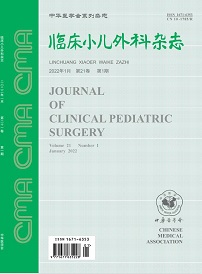Parenteral Nutrition Leads to Alteration of Inflammation Cytokines and Receptors Gene Expression in the Rat[J].Journal of Clinical Pediatric Surgery,,10():87-89.
Parenteral Nutrition Leads to Alteration of Inflammation Cytokines and Receptors Gene Expression in the Rat
- Keywords:
- ; Parenteral Nutrition; Total; Hepatocytes; Chemokines; Rats
- Document code:
- A
- Abstract:
-
【Abstract】ObjectiveTotal parenteral nutrition has been widely used during the past thirties years. It has been found to be an effective and relatively safe method for supplying energy and nutrients to patients with intestinal dysfunction, however, longterm TPN induces a high rate of liver disease in infants. The goal of this experiment was to further study the role of inflammation cytokines and receptors and the potential mechanism of TPNinduced hepatocyte injury by investigating the differential expresision of the inflammatory cytokine genes and receptors. MethodsTwelve infant (22~28 days old ) male SD rats weighing 90~100g were randomly divided into two groups (n=6). The control group received an oral diet, while the total parenteral nutrition group received continuous TPN infusion through a silastic catheter inserted in the right jugular vein. After 7 days part of the liver was taken for the examination of inflammatory cytokines and receptors gene expression with the oligo gene microarry to analyse the differential expression of the genes in the rats receiving TPN infusion.ResultsCompared with the control group, the 7day TPN group was associated with an upregulation of IL1r2 IL-1β IL1rn IL-18 TGF-α TGF-β1 TGF-β2 TGF-β3 TGF-β1il TNFsf6 IFN-γbp Ccl4 Cyrl, and a downregulation of Bmp2 XCR1 FGF10 FGFr2 IL-15 TGF-βr2 Scya11 FGF1 IL-10α LTa Bambi Caspase1 Cxcl10 FGF16 FGF21 Frag1 TNFsf4.ConclusionsThe rats after TPN show immune suppression in the liver and a slow immune response. The upregulation of IL-1β, TGF-α and IL-18 may be related to TPNinduced liver injury.
References:
1Cavicchi M,Beau P,Crenn P,et al.Prevalence of liver disease and contributing factors in patients
failure\[J\].1 Ann InternMed, 2000, 132 (7):525—532.
2Cruccetti A,Pierro A,Uronen H,et al.Surgical infants on total parenteral nutrition have impaired cytokine responses to microbial challenge\[J\].Pediatr Surg,2003,38:138—142.
3Tomoyuki M,Kazuhiko F,Yoshinori M.Nutritional route affects ERK phosphorylation and cytokine production in hepatic mononuclear cells\[J\].Surg,2007,245(4):642—650.
4Okamura H,Tsutsui H,Komatsu T,et al.Cloning of a new cytokine that induces IFN-γproduction by Tcells\[J\].Nature,1995,378(6552):88.
5Tsutsui H,Matsui K,Kawada N,et al.IL-18 accounts for both TNF-alpha and Fas ligand-mediated hepatotoxic pathways in endotoxin-induced liver injury in mice\[J\].J Immunol,1997,159 (8): 3961.
6Galle PR,Hofmma WJ,Walczak H,et al.Involvement of the CD95 (APO-1/Fas) receptor and ligand in liver damage\[J\].J Exp Med,1995,182(5):1223.
7Tazuke Y,Wildhaber BE,Yang H,et al.Total parenteral nutrition leads to alteration of hepatorcyte cell cycle gene expression and proliferation in the mouse\[J\].J Dig Dis Sci,2007,52(4): 920—930.
